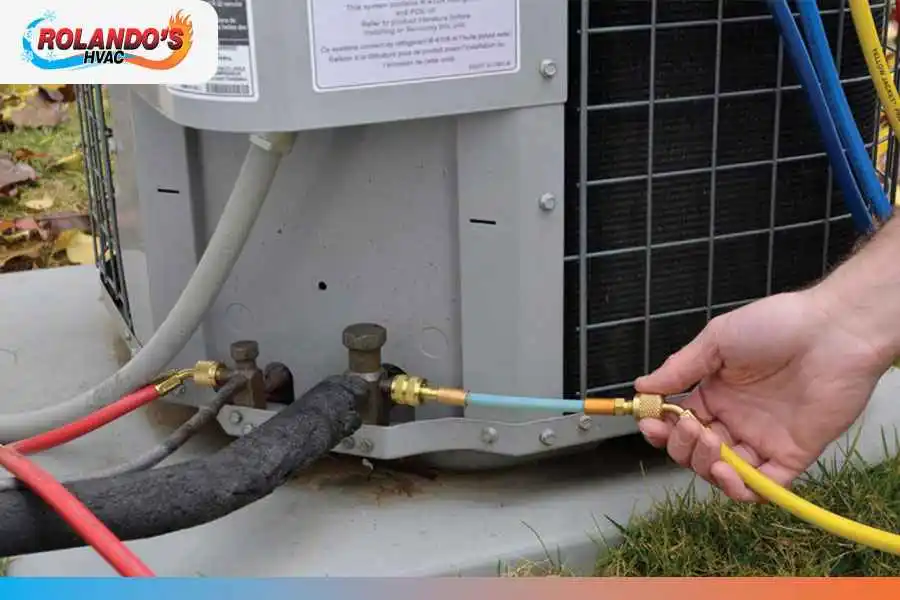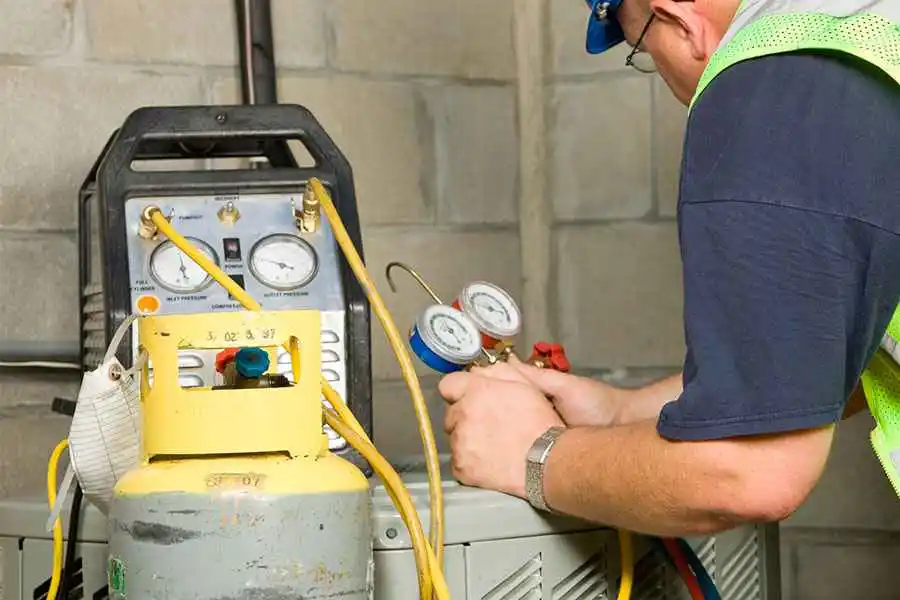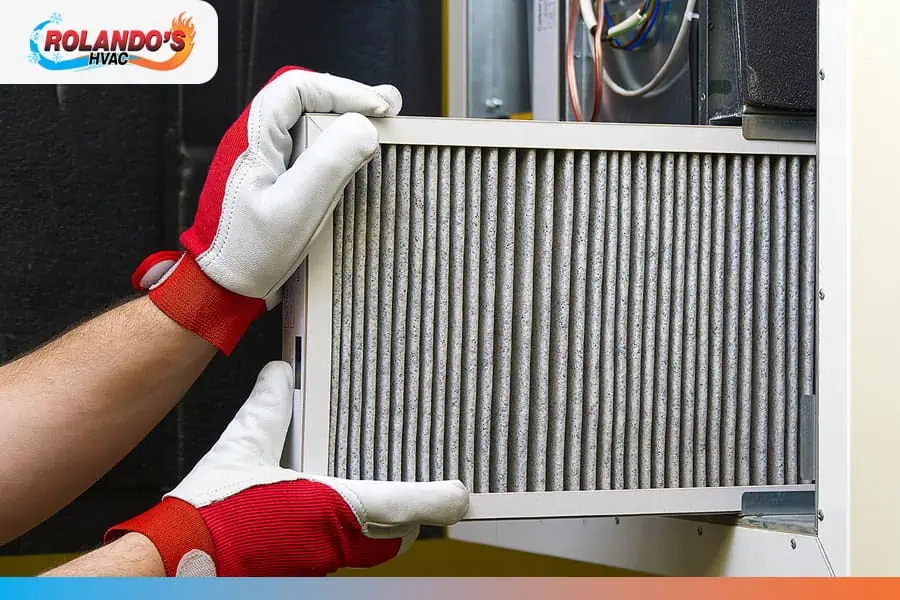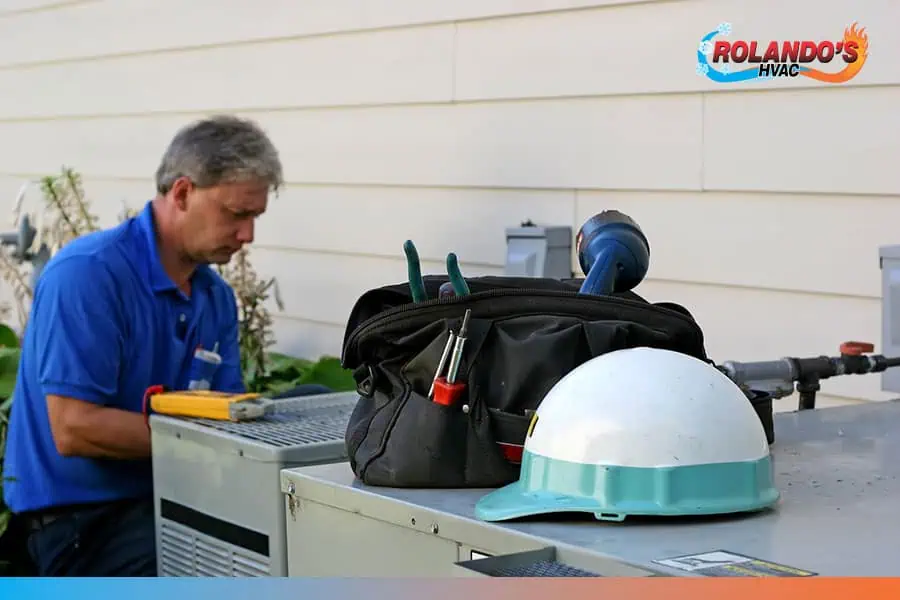
April 2, 2025
How Refrigerant Leaks Affect Your Tampa AC & What to Do About It
Tampa’s extreme climate puts immense stress on air conditioning systems, increasing the risk of refrigerant leaks.Both traditional air conditioners and heat pump systems rely on refrigerant to regulate temperature. The evaporator absorbs heat, while the condenser releases it outside, keeping coolant circulation steady.A refrigerant leak reduces efficiency and increases energy consumption. Over time, it can cause total AC failure. If ignored, leaks may lead to compressor damage, resulting in expensive Tampa AC repairs or full system replacement.
What is Refrigerant and Why is It Important?
Refrigerant, also called Freon, is a cooling chemical used in air conditioners. It absorbs heat from inside your home and releases it outside, helping your AC keep temperatures comfortable.
Unlike fuel in a furnace or gas in a car, refrigerant doesn’t get used up. If levels are low, it means there’s a leak, which can affect your AC’s performance and increase energy costs. A refrigerant leak reduces cooling efficiency, increases electricity consumption, and places extra strain on the compressor, leading to potential air conditioning unit failures.
Homeowners with older air conditioners using R-22 refrigerant should note that this type has been phased out, making repairs more expensive. Upgrading to a newer system can improve energy efficiency, reduce total cost of ownership, and lower environmental impact by reducing greenhouse gas emissions.
Signs Your AC Has a Refrigerant Leak in Tampa
If your air conditioner is leaking refrigerant, you might notice several telltale signs that indicate a problem with your system's cooling efficiency and overall performance.
- Weak or Warm Air from Vents – The AC runs but does not cool efficiently, often due to low refrigerant pressure.
- Higher Energy Bills – Increased electricity usage due to reduced cooling capacity and compromised heat transfer.
- Ice on Evaporator Coils – Low refrigerant causes the evaporator to freeze, restricting airflow and reducing efficiency.
- Hissing or Bubbling Sounds – A refrigerant leak creates bubbling or hissing noises near refrigerant lines, the condenser, or the coolant system.
- Short Cycling – The AC turns on and off frequently, struggling to maintain temperature.
- Humidity Issues – Reduced indoor air quality and increased moisture due to poor dehumidification.
- Faulty Sensor Readings – A refrigerant leak can cause the thermostat to misread temperatures, while a faulty diode or sensor may disrupt cooling cycles.
- Water Damage – A clogged drain can cause water to accumulate, increasing the risk of mold and further system failures.
- Unusual AC Behavior – Excessive vibration and unusual noise from the AC could indicate capacitor wear or loose refrigerant lines.
- Strange Smells – A distinct chemical odor near the AC unit may signal a gas leak from the refrigerant line, which can be detected by a strong sense of smell.
Learn more about the signs your Tampa air conditioning system may need repairs in our blog.
How Tampa’s Climate Makes Refrigerant Leaks Worse
Tampa’s heat, humidity, and coastal conditions can accelerate refrigerant leaks, leading to air conditioner system failures due to several environmental and system-related factors:
- Extreme Heat & Humidity – Tampa experiences prolonged periods of high temperatures and humidity, which forces AC units to run longer cycles. This continuous operation puts extra strain on the system and its components, increasing wear and tear on refrigerant lines and valves. Over time, this can lead to complete system failure if refrigerant leaks go undetected.
- Frequent Storms & Salt Air – Florida’s tropical climate means regular exposure to storms, heavy rains, and high winds. These conditions, combined with salt air from the coast, can lead to corrosion of refrigerant lines, copper tubing, and external unit components. Corrosion weakens the system, making leaks more frequent and increasing the likelihood of AC breakdowns.
- Older AC Systems – AC units that are over 10 years old are naturally more prone to wear and tear. Over time, joints, seals, and tubing weaken, increasing the likelihood of refrigerant leaks. If leaks persist, older systems may struggle to maintain cooling performance and eventually fail.
- Debris & Outdoor Elements – Storm debris, sand, and dirt can accumulate around the AC unit, leading to drainage blockages and affecting its ability to function efficiently. A clogged condensate pump or air filter can increase pressure on the system, worsening leaks and contributing to AC failure.
Learn more about the causes of AC failures in Tampa in our blog.
What Causes AC Refrigerant Leaks in Tampa?
Several factors contribute to refrigerant leaks, making them a common issue for homeowners in Tampa. Understanding the root causes of these leaks can help prevent costly repairs and system failures.
- Corrosion from Humidity & Salt Air – A refrigerant leak can develop when copper tubing deteriorates from prolonged exposure to moisture, oxidation, and formic acid deposits. Exposure to formic acid accelerates copper tubing erosion, which can contribute to refrigerant leaks and ozone depletion.
- Improper Installation – Poorly sealed Schrader valves, joints, and connections can create vulnerabilities in the system, leading to slow leaks. Incorrect pressure calibration during installation can also contribute to long-term refrigerant loss. Leaks often occur at weak points like the Schrader valve, pipe connections, or refrigerant hose attachments.
- Physical Damage – Storm debris, pests, and vibrations from regular operation can weaken refrigerant lines, seals, and gaskets.
- Age & Wear – A refrigerant leak occurs when gaskets, brazing, and seals degrade over time. If ignored, this can result in increased system strain and eventual AC failure. Learn more in our blog: How Long Do AC Units Last?
- Factory Defects – Some units may have manufacturing flaws such as defective tubing, poor brazing, or weak structural points that result in premature leaks. If not addressed, these defects can lead to refrigerant loss and system inefficiencies.
- Factory Defects – Some units may have manufacturing flaws such as defective tubing, poor brazing, or weak structural points that result in premature leaks. If not addressed, these defects can lead to refrigerant loss and system inefficiencies.

Why You Should Never Just "Refill" Refrigerant (and What to Do Instead)
Simply adding refrigerant to a leaking air conditioner is a short-term fix that leads to wasted money, water damage, corrosion, and compressor failure. Leaks can release greenhouse gases like Freon, affecting indoor air quality and contributing to ozone depletion.
In the United States, handling refrigerants requires an EPA Section 608 certification due to regulatory compliance. DIY refills risk health hazards, like headaches from gas leaks or formic acid corrosion in copper tubing.
The Correct Solution Includes:
- Leak Detection – Using infrared gas detectors, nitrogen, and dye to identify leaks in copper pipes, evaporators, condensers, Schrader valves, and HVAC systems.
- AC Refrigerant Leak Repair – Sealing leaks with solder, sealant, brazing, or replacing worn gaskets to prevent moisture buildup and acid erosion.
- Refrigerant Recharge – Ensuring proper temperature calibration, using factory-approved coolant, and verifying air conditioning performance with a thermometer.
- System Testing & Maintenance – Checking pressure, airflow, thermostat accuracy, capacitor wear, vibration levels, and UV light damage. Technicians also inspect drainage, energy efficiency, furnace compatibility, and heat pump operation.
Ignoring HVAC maintenance can lead to higher electricity bills, water damage from condensate pump failures, and premature air conditioner replacement. Contact a certified HVAC technician for an inspection before leaks escalate into costly downtime.
How to Prevent Refrigerant Leaks in Your Tampa AC
Preventing refrigerant leaks is essential to maintaining your air conditioner's efficiency and longevity, especially in Tampa’s hot and humid climate. Regular maintenance, timely repairs, and proactive system care can help homeowners avoid costly refrigerant-related issues. By understanding the common causes of leaks and implementing preventive measures, you can ensure your AC runs smoothly throughout the year.
- Schedule Regular AC Tune-Ups – Routine HVAC maintenance helps detect a refrigerant leak early, preventing major AC damage.
- Protect Your Outdoor Unit – Storm debris and salt air exposure can lead to leaks.
- Upgrade Refrigerant Lines – Older pipes and valves may need replacement before leaks occur.
- Don’t Ignore Weak Cooling – If your AC struggles to maintain temperature, schedule an inspection before the issue worsens.
Learn more about The Importance of Routine AC Maintenance in Tampa in our blog.
What to Do If Your AC Has a Refrigerant Leak in Tampa
A refrigerant leak reduces your air conditioner’s performance, making it harder to cool your home. Ignoring the issue can lead to increased energy bills, system strain, and even complete AC failure. Addressing the leak promptly with professional repair ensures your AC runs efficiently and prevents further damage. Here’s what you should do if you suspect your system is losing refrigerant.
- Turn off your AC – Running it with low refrigerant can damage the compressor.
- Avoid DIY Fixes – Refrigerant requires specialized handling and improper repairs can make the issue worse.
- Schedule an AC Inspection – A licensed HVAC technician can detect leaks and provide professional air conditioning repair.
- Act Quickly – Delaying repairs can lead to higher electricity costs, compressor failure, and water damage.
Need expert air conditioning repair in Tampa? Contact a licensed HVAC professional for refrigerant leak detection and repair.
Fixing Refrigerant Leaks Saves You Money and Comfort
Refrigerant leaks don’t just lower cooling efficiency—they strain your entire air conditioning system, leading to higher energy bills, poor indoor air quality, and eventual air conditioner failure. Given Tampa’s extreme heat and humidity, addressing leaks promptly is essential to keeping your home comfortable and avoiding costly repairs.
If your air conditioner is struggling to keep up with the Florida heat, it might have a refrigerant leak. Ignoring the issue could result in compressor damage, system breakdowns, and increased electricity costs.
📞 A refrigerant leak won’t fix itself—Call (813) 373-6804 or Request Service Online for expert air conditioning repair in Tampa!

Rolando’s HVAC











